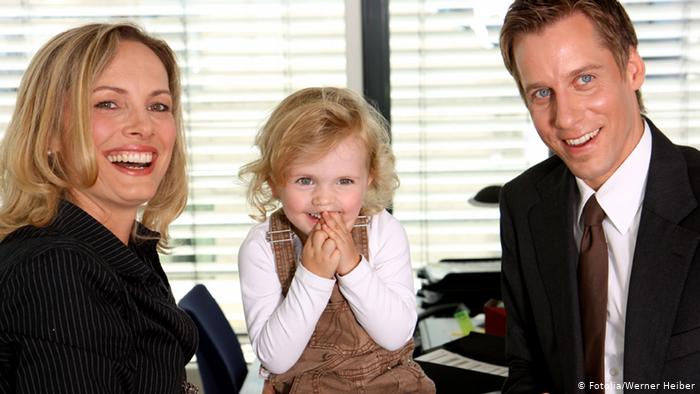Germany’s birth rate Child deficiency is becoming a problem for Germany
Nowhere in the world do people have fewer children than in Germany. But if you choose children, you can’t do it right: not your partner and children – and certainly not your employer.
- Share article by:
- Share article by:

costs
From play dolls to studies – children cost a lot of money. This financial burden discourages many Germans from having children. This was the result of a survey by the BAT Foundation for questions about the future. According to this, 67 percent of the respondents believe that the money prevents many from starting a family. The value has increased alarmingly, in 2011 it was only 58 percent, said the scientific director of the foundation, Professor Ulrich Reinhardt. According to the Federal Statistical Office, families spend around 550 euros a month on a child.

Freedom and independence
Celebrating at the weekend, meeting friends, traveling: According to 60 percent of those surveyed, Germans do not want to give up their freedom and independence for a child. Financial incentives from the state don’t seem to be an argument either. A woman in Germany has an average of 1.36 children, compared to an average of 1.57 in the EU. For the study, 2,000 people aged 14 and over were asked why so many Germans do not start a family.

Career
A career break is the homicide argument against children for 57 percent. Even if politicians are fighting for flexible working models, easier re-entry into the job and equality between men and women, the Germans do not want to endanger their jobs for newborns in the family.

Also the opinion that career is difficult with family arrange, was given more often than two years ago (54 instead of 48 percent). The study concludes that both politicians and the general conditions as well as companies are required, at last Comprehensive with the possibility of starting a career with a child seriously. "The insecurity, almost fear of starting a family, continues for many Germans," sums up Foundation Director Reinhardt.

State support
Even if there is a legal entitlement for children under three years of age to have a daycare place from August 1st, this is far from enough for the Germans. 45 percent of those surveyed believe that the state is still doing too little to increase the birth rate in Germany. The argument was heard much more often in the west than in the east, the foundation said. The value has remained unchanged in the past two years.
Uncertain future
Economic crisis, climate change, demography: 39 percent of those surveyed think that an uncertain future is the reason why many Germans choose not to have a child. According to the foundation, however, the argument has clearly lost importance (−7 percentage points).
The right partner
Sometimes it is also very simple why no youngsters are planned – the right partner is simply missing. For 39 percent of those surveyed, this is the reason why Germans have so few children. The number of single households in Germany has been increasing for twenty years, especially singles between the ages of 30 and 59 are living more and more alone. Almost a third of German singles are dissatisfied with being alone and want a partner.
The low birth rate is becoming a location problem for Germany: The fewest children are no longer born only across Europe, but now worldwide, according to the study by the auditing company BDO and the Hamburg World Economic Institute (HWWI). According to this, an average of 8.2 children per 1000 inhabitants were born in the past five years. That is below the level of the previous tail light Japan of 8.4 children per 1000 inhabitants.
Among the EU countries, only Portugal (9.0) and Italy (9.3) do similarly poorly. The other large EU countries, on the other hand, have significantly higher birth rates. France and Great Britain have an average of 12.7 births per 1000 inhabitants in the same period. The highest birth rates are found in African countries, above all Niger with 50 births per 1000 inhabitants.
Shortage of skilled workers and higher wage costs
According to HWWI director Henning Vöpel, developments in this country have considerable disadvantages and consequences for the attractiveness and performance of Germany as a business location. The age group of the employable from 20 to 65 years will shrink from the current 61 percent by 2030 to 54 percent. "In no other industrial country, despite the influx of young labor immigrants, this trend is worsening as strongly as in Germany," said Vöpel.
The most attractive regions for skilled workers
According to the current specialist atlas of the job exchange Stepstone, 44 percent would immediately pack their suitcases and move to Bavaria if they found a suitable job there.
North and south: 38 percent each named Baden-Württemberg and the city-state of Hamburg as attractive regions for skilled workers.
A third want to work in North Rhine-Westphalia.
Berlin may be sexy. However, as a specialist region, the capital is only attractive for 28 percent of those surveyed.
Even fewer, namely 21 percent, can imagine moving to Hesse to work.
Lower Saxony thinks 20 percent is an attractive region for skilled workers.
16 percent want to go to Rhineland-Palatinate.
13 percent are drawn to Schleswig-Holstein.
Only eleven percent want to live and work in Bremen.
Nine percent could imagine moving to Saxony for a job.
Brandenburg and Mecklenburg-West Pomerania each identified seven percent as an attractive region for skilled workers.
Six percent would move to Thuringia.
Five percent want to go to Saarland.
Four percent could imagine moving to Saxony-Anhalt.
As a direct consequence, higher non-wage labor costs threatened in Germany, indirectly a lack of skilled workers. "Without strong labor markets as a central location factor, Germany cannot maintain its economic lead in the long run," said BDO board member Arno Probst. "Against this background, the immigration of young skilled workers appears to be an indispensable stabilization instrument." The gainful employment of women must also be promoted in order to ensure economic performance.
Parents have a guilty conscience
But if you have to work full-time and look after children, you can skid quickly. Spending time with the children, getting off to a successful start, and also giving space for partners, friends and hobbies – many parents fail when trying to meet all demands. 56 percent of working mothers and fathers struggle with remorse because they believe that in day-to-day coexistence between work and family, someone is always neglected. This is shown by a representative forsa survey commissioned by the online learning specialist scoyo among working parents of children between the ages of six and 14.
Above all because of the children, the respondents have a guilty conscience: 52 percent repeatedly feel that they are spending too little time with their sons and daughters. 41 percent believe that they do not support their children enough in school.
What is neglected by mothers and fathers
The job is the bottom of the list of things that parents neglect: Just 12 percent of the mothers and 8 percent of the fathers surveyed found that they were investing too little time in their work.
Responded parents of children under 16 years of age who stated that they did not meet all requirements.
Source: Inst. Für Demoskopie Allensbach
Whether one’s own friends are neglected or not is perceived in a gender-specific manner: Although almost a third (32 percent) of the women surveyed find that they do not devote enough time to their friends, the figure is considerably higher for men (56 percent).
Here, the discrepancy between men and women is not quite as great as in the different perceptions regarding the neglect of friendships. A clear trend can also be seen here. Only 21 percent of the men surveyed believed that they actually had to do more in the household. In contrast, it was 35 percent among women.
Well over two-thirds of the men surveyed stated that their children were neglected in their time management. The figure was 41 percent for women.
The partnership is also neglected by more fathers than mothers: 47 percent of the women surveyed said that their partner was not given enough time, but 73 percent of the men.
53 percent of the men surveyed and 56 percent of the women surveyed found that they themselves were neglected.
Almost half of all parents (49 percent) also feel guilty about themselves because, as mothers or fathers, they neglect their own interests. 45 percent also fear that they are too little for their partner.
Internal conflicts arise when the parents think of themselves: 42 percent of those surveyed report a guilty conscience because they take their job very seriously. Parents, however, place a little less importance on professional development: only a little more than one in three parents fear that their own careers will not be promoted enough.
The decision for a part-time job does not seem to improve the situation either: 55 percent of the part-time employees surveyed know the feelings of guilt as well as 56 percent of full-time employees. Mathias Voelchert, coach and founder of familylab.de, advocates a combination of shorter working hours for parents and longer childcare times: “Parents need to go home from 4 p.m. to gain strength and with their children to be together. I would like schools that offer good childcare until 2 or 4 p.m. and employers who release parents from 4 p.m. or 5 p.m. ”What can be done in eight hours can also be done in six or seven hours – twice that Father convinced.
Daniel Bialecki, managing director of scoyo believes that it is not enough to reorganize everyday life to relieve parents of remorse. “Many parents feel massive educational pressure to enable the children to have a secure future. And here, too, most people think they have to take the entire funding into their own hands. "
RELATED ITEMS
-

Birth rate in Germany is increasing again – naturopathy – naturopathic specialist portal
This text corresponds to the specifications of the medical literature, medical guidelines and current studies and was developed by medical professionals…
-

Working moms annoying? Why Germany has a problem and I don’t feel like it anymore!
in theory everything is good photo. René Löffler On Monday I almost jumped out of my business pants at 8:15 a.m. Until then it was a normal day: at…
-

Child poverty in Germany: almost everyone believes that politics is not enough
(Photo: picture alliance / Julian Strate) Child poverty often plays only a minor role in politics. Most Germans would…
-

Most parents in Germany still think in old models: the man works, the woman looks after the children. Only the east ticks differently, like one…
